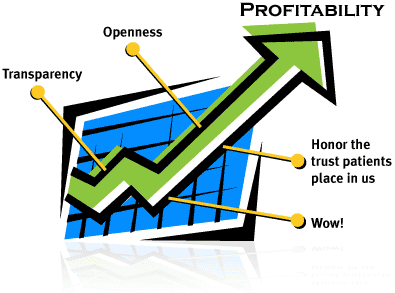
Much has been made about the potential for viable businesses in the health 2.0 movement. In short, these articles and blogs (among others) openly and appropriately question the long-term viability of the space:
- Seattle Post-Intelligencer
- Wikinomics Blog
- Chilmark Research Blog
- IHealthBeat
- San Francisco Chronicle
Are they right? That answer is unclear, but they are right to ask. In our spirit of openness at PatientsLikeMe, we’re going to share some of our experiences as we evolve our commercialization strategy.
In order to give context to the discussion, however, we want to share our corporate values. These values shape our lenses so when we have partnership opportunities, we see 20/20, and avoid color blindness, i.e. only seeing green.
Honor the trust patients place in us
Simply stated, this means “Patients First”. Patients trust us with their most valued health information and share it with people they believe have the same collective goals. We can’t overestimate the trust we’re given
Openness
Per our Openness Philosophy, we believe that sharing health information is good. Why? Because sharing will drive massive change in healthcare.
Transparency
No surprises. Our members shouldn’t be surprised by any of our steps, especially in business development. We will disclose all of our partnerships on the site.
Wow!
When people see our site, we want them to think, “Wow!” Achieving our vision takes flawless execution and understanding of patient needs.
With these core values in mind, we attempt to match the needs of our patients with the goals of our partners. If the two are misaligned, then we pass on the deal. In fact, we have passed on dozens of opportunities because they weren’t aligned with our core values. We must embrace a high ethical standard because patients share data with us that would historically be held private—not just for their own benefit, but for that of others. Since they’re selfless, we must consider that selflessness when we enter into potential partnerships. If it doesn’t feel right, it’s not right.
Here’s an example of a deal we passed on. A provider directory service approached us about adding their solution onto our site. Patients need access to providers in their areas, right? The solution would be branded to PatientsLikeMe, and be fully integrated with the look and feel of our site—and with no upfront cost. So far so good.
As in all deals, the devil’s in the details. This company offered an ad-based revenue share model such that ads would be served as part of the solution on our site. The pitch was that this module would help to “monetize our community”.
People join PatientsLikeMe to share real-world information about their experience with their disease. They seek answers from each other; tricks that can help them have a better quality of life everyday. They share their data with the hope of providing a leading body of research that can advance the knowledge of the disease. If we were to work with this partner, the advertisers’ content would appear on our site without being subjected to the scrutiny of our core values. Essentially we would be getting paid to “look the other way” as any company willing to pay to promote their products gets back door access to our community. Patients entrust us to provide a safe environment for information sharing and to preserve the sanctity of our community. This deal didn’t feel aligned. So while we like the idea of a provider directory solution, we politely declined the opportunity.
Perhaps we’re not maximizing potential revenue for our business. Some of these deals may have net us a tidy stream of cash. It’s our belief, however, that endeavoring to solve the problems of disease through insight and information will yield demand for our products and services eclipsing that of misaligned options. Our core values wouldn’t be real if we weren’t principled in how we design our business. So we look for partners who are driven to advance knowledge in the disease and improve the day-to-day lives of patients. This may be a slower path to profitability, and one less traveled, but we believe it’s the right way to build PatientsLikeMe.
